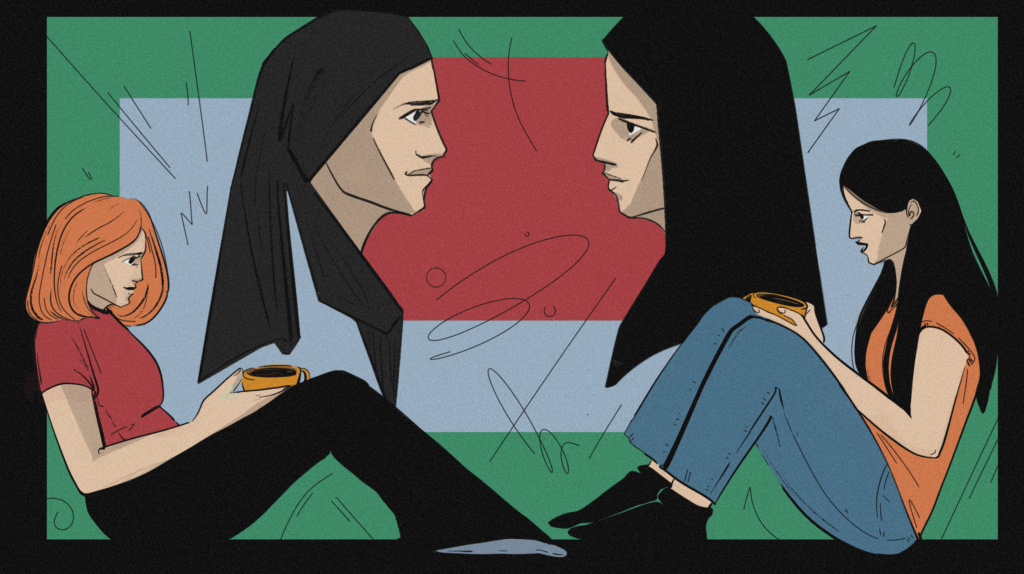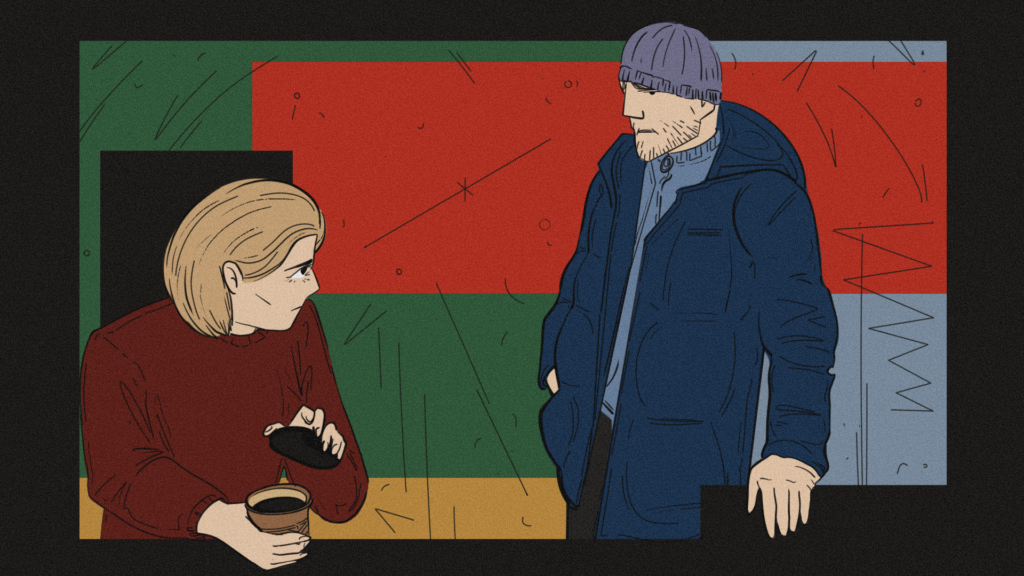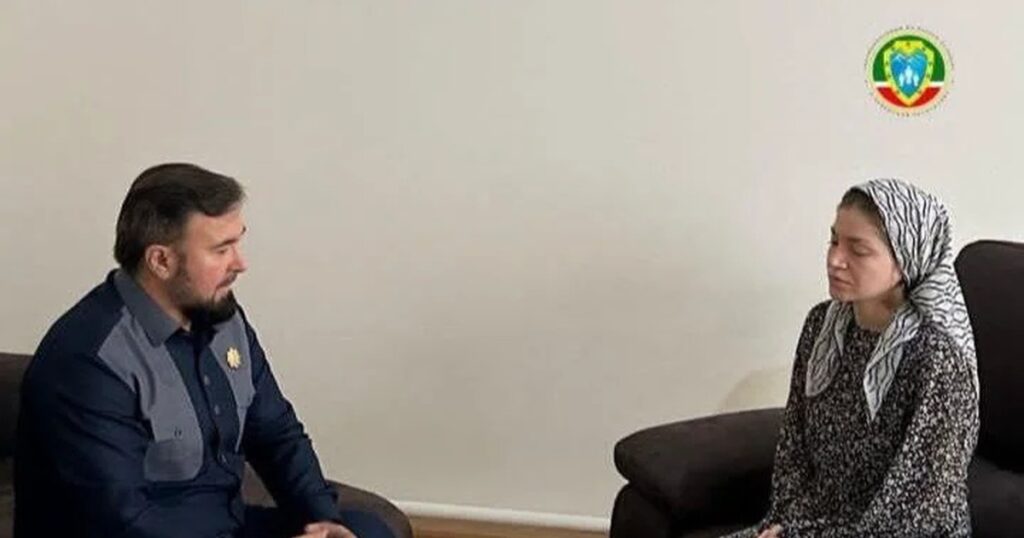In August, a year had passed since Seda Suleimanova’s disappearance—a Chechen young woman who fled from her family only to be forcibly returned home. Throughout this time, Seda’s friend Lena Patyaeva has been speaking out: she has staged protests in Saint Petersburg, run campaigns in the media and on social networks, and urged authorities to investigate Seda’s disappearance.
But Seda’s fate is not only a concern for human rights activists and Lena. Another friend, Maryam, who also fled the North Caucasus, met Seda at the NC SOS shelter. For the first time, she decided to speak publicly about her friendship with Seda, the traditions of their region, and Seda’s fear that her family would find and kill her.

“She Left Home, But Home Didn’t Leave Her” — How Maryam and Seda Met
I’m also a runaway from the Vainakh people (an ethnic group that includes Chechens and Ingush, native to the North Caucasus region). Seda is Chechen, while I am Ingush. But the language and culture of our peoples are very close, as is the status of women in our societies. I had problems with my family and eventually, fearing for my life, decided I needed to leave the country. I turned to NC SOS Crisis Group, and they placed me in a shelter where I met Seda. We shared a room for two months.
My first impression of her was that she was a very caring person. When I first walked into our room, a prepared meal was waiting for me on the table. I immediately felt a sense of home. It was such a warm gesture: Seda had run from her home, but her upbringing stayed with her. This behavior, which we call “gillakh” in Chechen, or “rules of conduct,” encompasses respect, hospitality, and how you treat others.
In reality, we acted in ways not allowed in the shelter. The rules prohibit discussing personal backgrounds or even sharing real names. But Seda and I talked openly from day one, revealing everything to each other. We quickly realized we were both Vainakh. By her mannerisms, I guessed she was Chechen, but she couldn’t figure out my background. Then, at some point, I responded to her in Ingush, and her eyes widened, “I’d never have guessed you were Vainakh; you don’t look it at all!” She was truly surprised.

We felt very comfortable together. There was no adjustment period—we were like a family who hadn’t seen each other in a long time and then found each other in a place. We spent nights talking about the situation in Chechnya and Ingushetia, about our families and lives. I never had a sister, and Seda became like an older sister to me. We even wrote poems for each other, calling each other “sister.” Seda is deeply caring and kind-hearted. Even if she wasn’t doing anything specific, just being around her made you feel safe.
“Running Away Is a Shameful Act” — Seda’s Family
Her father died when she was young, so she never knew him. People would say, “Poor girl, she doesn’t even know her father.” Eventually, Seda internalized this, missing someone she had never met, suffering for someone who was, in a sense, forced upon her.
Seda was the youngest in her family, often treated like a child without responsibilities or choices. She disliked this. She wasn’t especially close with her sisters, who were all older and married early. But her brother loved her deeply. Although strict by nature, he was never harsh toward her. However, he had no idea his sister was about to break all their traditions and rules. In his eyes, she was a good girl. Her nieces and nephews, her brother’s children, also adored Seda. They lived with her and her mother in the same home, as per tradition.
She never spoke badly of her relatives; she loved them. Her relationship with her family was good but not especially close. The family was religious and traditional, which Seda found oppressive—especially as she approached 25 and faced increasing pressure to marry. Her family wasn’t outwardly violent or abusive, but there was a lot of moral pressure.
One doesn’t need physical violence to feel compelled to leave. The life her family wanted for her didn’t suit her. Seda had an independent spirit and questioned things: Why, at 25, did she have to get married? Why the rush? She didn’t even have anyone she loved. Why should she follow this script and marry?
Seda realized that Chechnya’s ways didn’t suit her and yearned for a freer life. It wasn’t just her family; society was pressing down on her, too. In Chechnya, her path was set: cleaning, watching her nieces and nephews, cooking, and waiting to marry, eventually moving into her husband’s family. It didn’t matter if she’d be happy.
Seda felt there had to be another way. I had felt it, too, a resistance to tradition inside me. Seda felt it as well. She wanted a different life, so she decided to leave. She took responsibility for her life and her choices.
She knew that as soon as she ran, they’d start searching, and if she was returned, things would only get worse. Despite her relatives’ love, fleeing was a disgrace. She understood her life would be at risk and decided to reach out to NC SOS.
We discussed what would happen if they caught her. I thought they wouldn’t kill her because they loved her. But she was convinced: “I’m not a child anymore. They won’t forgive this.” Her fear was real, that they’d never forgive her and might kill her, saying, “There are no other options.”
“Seda Is Incredibly Strong” — Life After the Shelter
Seda initially sought help just to leave Chechnya, not Russia. When her time at the shelter ended, she began an independent life and found a job. She and the NC SOS team thought she was safe and that no one was looking for her.
Around this time, I introduced her to Lena Patyaeva. Lena was looking for a roommate, and Seda needed someone to share rent with, as living alone in St. Petersburg was too expensive without a steady job.
Seda worked at Baggins Coffee. One day, her cousin showed up at her workplace, making threats and saying they’d find her anywhere. She managed to escape and sought help from NC SOS again. They placed her in another shelter, where we lived together for a couple of weeks, and then she was moved to another safe place. After that, we kept in touch from a distance.

She was considering moving abroad, but the unknown scared her. So she decided to stay in St. Petersburg. She thought her family didn’t have strong connections and that her cousin’s threats were empty.
During this time, she met Stanislav online. They were immediately comfortable with each other and soon started living together. Their relationship was harmonious; it was clear they cared for each other. Stanislav found her work that felt safer—taking care of dogs while their owners were away.
Despite living with Stanislav, she stayed independent, which I greatly admired. Seda was incredibly strong.
“Like a Big Sister” — Seda’s Friendships with Different People
Stanislav introduced Seda to his friends and family. Everyone knew and loved her, and their connection grew to feel like family. Stanislav’s mother and grandmother would send Seda homemade preserves, and his friends took to her right away. Seda fully embraced her new life as though she had been born there—her spirit fit Saint Petersburg perfectly.
Seda and Stanislav believed their relationship was for life. About four months after they started dating, they decided to register their relationship officially. Looking ahead, they dreamed of having children and building a complete family once they were on firmer footing.
By that time, I had also finished the NC SOS rescue program. My situation had improved, and I decided not to leave Russia. This meant I could reconnect with Seda in person, and we began speaking every day. We grew so close that Seda became like family to me—I couldn’t imagine life without her. It didn’t feel like mere friendship; Seda was like a big sister to me. At one point, when I was going through a tough time and struggling, she would visit me with containers of food she had cooked herself. Seda truly took care of me.
When someone feels like they’re truly “yours,” when your stories are so intertwined, you don’t even need words to feel their support. We were completely at ease with each other. We spent so much time together, creating wonderful memories. Lena also became very close to Seda.
The three of us often went out together—visiting beaches or swimming quarries, relaxing, talking, and sharing our stories with Lena. Most importantly, we were always there for one another during hard times.
“She Looked Like a Zombie” — On Seda’s Abduction
The day before Seda was abducted, we were chatting about kittens. Someone she knew was giving away kittens, and she asked if I’d like to adopt one. That was our last conversation.
I was in shock when Stanislav messaged me to say Seda had been kidnapped. At the time, I was at home watching a movie, and I dropped everything I was holding. I immediately called him to get more details and then reached out to NC SOS. Those first few days after her abduction were a blur—I was so distraught I can barely remember them.
Then that photo of Seda appeared, and it nearly stopped my heart. Just days before, she had been smiling, joking, and sharing stories. We had talked about our plans for the future, shared our worries and hopes, laughed, and listened to music together. She was vibrant, happy, calm, and free. And then, suddenly, there was this picture—like something from a completely different world, a world of despair.

Seda looked like a zombie. I’m certain she had been beaten—you could see the terror in her eyes. The photo radiated sheer hopelessness. It was heartbreaking. I stared at it, realizing she was utterly alone, surrounded by people who were filming her, judging her, mocking her, and humiliating her. It hurt to think that no one was there to hold her, comfort her, or say, “It’s okay, we’ll get through this.” In that moment, I wished more than anything to be with her and hold her close.
After Seda was taken, I stayed in constant contact with Lena, Stanislav, and the NC SOS team. We always consulted with each other and worked as a team. But at some point, Stanislav lost hope and decided there was nothing more to be done. He believed the reports from human rights activists claiming Seda had been killed.
Stanislav gave up and decided it was better to move on since he felt powerless to change the situation. But Lena’s determination is stronger—she refuses to give up. Although I’ve since moved to another country, I stay in touch with her. We take every precaution: Lena doesn’t know my real name or even which country I’m in. I always use anonymous accounts to contact her. I trust her completely, but this way, we both stay safer while she remains in Russia.
“A Daughter is the Pride of the Family, the Chechen Republic, and the People” — Threats from Seda’s Brother
After her escape, Seda occasionally spoke with her mother using anonymous accounts. She expected her mother to react with anger, but instead, her mother broke down in tears. She didn’t blame Seda but worried for her, saying, “What turmoil you must have felt inside to make this decision,” and “How did we fail to protect you?” It was deeply painful for Seda to see her mother’s reaction.
At the same time, her brother sent Seda a voice message through her mother’s account, threatening her. He said she could come back on her own, and if she did, everything would be fine—the family wouldn’t tell anyone what had happened. But then he added ominously, “As long as I’m alive, I’ll find you and bring you back. And then it won’t go smoothly. No matter how much I might want to help you, I’ll have no choice left.” He didn’t say it outright, but the implication was clear: Seda would be killed.
The idea of “honor killings” is completely senseless—it’s absurd. A daughter is considered the pride of her family, even the pride of the republic and its people. But if a woman has a relationship before marriage, acts “immodestly,” raises her voice, or if rumors spread about her, any of these can become reasons for an “honor killing.”
Even minor deviations from tradition can bring shame. Sometimes, these killings happen over mere rumors, with no evidence. Someone might claim to have seen a woman with a man, and that alone could lead to her death.
Of course, not every family resorts to such measures. But in general, “honor killings” are seen as a way to “cleanse” the family of disgrace, allowing them to hold their heads high again.
In Seda’s case, it didn’t matter that Stanislav had converted to Islam. People in the region are not religious but traditionalists. They don’t care what the Quran says about being Muslim above all else. For them, tradition is far more important than religion. What matters is that a woman marries someone from her own people. Even if she marries a Muslim from another ethnicity—for instance, a Kazakh—she may still face persecution. This runs completely counter to Islamic law, but tradition takes precedence.
“People Are Abducted, and the Authorities Look the Other Way” — Maryam on Why She’s Sharing Seda’s Story
I think it’s important to tell Seda’s story from a new perspective, as someone close to her. I want to do everything I can to bring attention to her case. I need answers—I need to know what happened to Seda.
The only way forward is to make Seda’s story as widely known as possible so that it can’t be ignored. Thanks to Lena’s relentless efforts, Seda’s case has already reached a lot of people. The more awareness we spread about cases like hers, the harder it becomes to bury the truth.
It’s critical to understand that if this kind of lawlessness can happen to one person, it can happen to anyone. It’s not normal for people to be abducted while the government looks the other way. A person has been missing for a year—no one knows if they’re alive or dead—and this is treated as routine because society has grown desensitized to it.
I still fear the media. Even though I’ve left Russia, I don’t feel entirely safe and worry about drawing the attention of my relatives. But I can’t stay silent. I’m deeply worried about Seda and have decided to speak to the media because I see no other choice. A year has passed, and no one knows where Seda is or what has happened to her. She’s become a ghost.
I believe Seda is alive, even though most people following her case are convinced she’s been killed. I feel she’s in a dire situation where she can’t reach out. Maybe she’s being held somewhere in complete isolation, living behind closed doors.
I know how these things work. In Ingushetia and Chechnya, people love to gossip about those they dislike. Many Chechens say, “She’s been killed,” simply because they hate and judge Seda. These rumors spread like wildfire. There’s also a culture of fear-mongering: “Look at what will happen if you disobey.” People even say, “I’ll kill you as an example to others.”
I can’t allow myself to believe she’s dead. If one day I’m proven wrong, I don’t know how I’ll recover. For now, I refuse to accept it. But if it turns out to be true, I’ll fight for justice. In that case, I’ll reveal my identity and do everything in my power to ensure those responsible are punished.